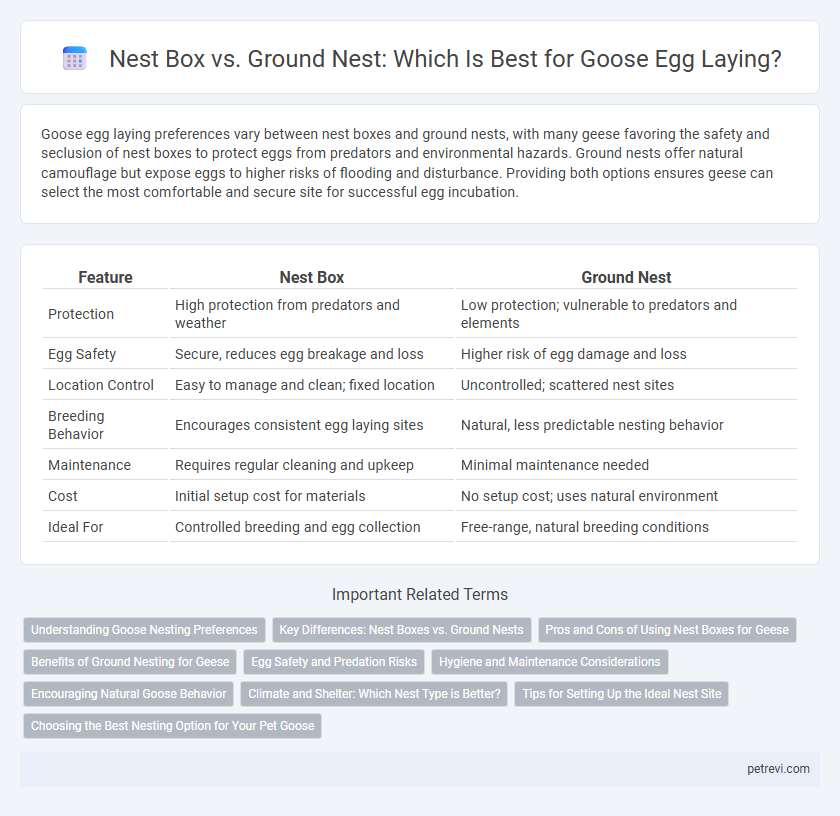Goose egg laying preferences vary between nest boxes and ground nests, with many geese favoring the safety and seclusion of nest boxes to protect eggs from predators and environmental hazards. Ground nests offer natural camouflage but expose eggs to higher risks of flooding and disturbance. Providing both options ensures geese can select the most comfortable and secure site for successful egg incubation.
Table of Comparison
| Feature | Nest Box | Ground Nest |
|---|---|---|
| Protection | High protection from predators and weather | Low protection; vulnerable to predators and elements |
| Egg Safety | Secure, reduces egg breakage and loss | Higher risk of egg damage and loss |
| Location Control | Easy to manage and clean; fixed location | Uncontrolled; scattered nest sites |
| Breeding Behavior | Encourages consistent egg laying sites | Natural, less predictable nesting behavior |
| Maintenance | Requires regular cleaning and upkeep | Minimal maintenance needed |
| Cost | Initial setup cost for materials | No setup cost; uses natural environment |
| Ideal For | Controlled breeding and egg collection | Free-range, natural breeding conditions |
Understanding Goose Nesting Preferences
Goose nesting preferences heavily favor secure, sheltered environments that mimic natural habitats, with many species showing a strong inclination for elevated nest boxes over ground nests to protect eggs from predators and flooding. Research indicates that nest boxes provide a dry, insulated, and predator-resistant site, significantly increasing egg survival rates compared to ground nests which are more exposed to environmental risks and disturbances. Understanding these preferences assists in designing optimal nesting setups that enhance reproductive success in both wild and captive geese populations.
Key Differences: Nest Boxes vs. Ground Nests
Goose egg laying in nest boxes offers greater protection from predators and weather compared to ground nests, enhancing egg survival rates. Nest boxes provide a controlled environment with better insulation and reduced disturbance, promoting higher hatchability. Ground nests, while natural and easy to establish, expose eggs to increased risks from predators and environmental fluctuations, often resulting in lower overall reproductive success.
Pros and Cons of Using Nest Boxes for Geese
Nest boxes offer geese a protected and secure environment for egg laying, reducing predation risk and keeping eggs cleaner compared to ground nests. However, nest boxes require regular maintenance, monitoring, and appropriate size to accommodate different goose breeds, and improper placement can discourage use. Ground nests allow natural nesting behavior and easier access but expose eggs to environmental hazards, predators, and potential trampling by other animals.
Benefits of Ground Nesting for Geese
Ground nesting offers geese a natural environment that closely mimics their wild habitat, promoting instinctual behaviors and reducing stress. This method enables better camouflage and protection from predators through natural vegetation and terrain, enhancing egg survival rates. Furthermore, ground nests provide ample space for geese to move freely, encouraging healthier nesting conditions and successful hatchings.
Egg Safety and Predation Risks
Goose egg safety improves significantly with a well-constructed nest box that provides elevated shelter from common predators such as raccoons and foxes. Ground nests, while natural, expose eggs to higher risks of predation and environmental hazards, including flooding and trampling by other wildlife. Secure, predator-resistant nest boxes with proper ventilation and concealed access points enhance hatch rates by minimizing egg loss.
Hygiene and Maintenance Considerations
Nest boxes for goose egg laying offer better hygiene by reducing direct contact with dirt and feces, minimizing the risk of bacterial contamination compared to ground nests. Ground nests require frequent cleaning to prevent buildup of moisture and pathogens, which can lead to egg damage and health issues for both eggs and adult geese. Proper maintenance of nest boxes includes regular bedding replacement and sanitation, ensuring a cleaner environment that supports higher hatch rates and healthier goslings.
Encouraging Natural Goose Behavior
Providing a nest box encourages natural goose behaviors such as selecting a secure, elevated site for egg laying, closely mimicking their instinct to find safe nesting spots. Ground nests allow geese to engage in traditional foraging and nesting habits, promoting comfort and reducing stress during egg incubation. Optimal nesting conditions balance protection from predators with access to natural surroundings, supporting healthy egg development and successful hatching rates.
Climate and Shelter: Which Nest Type is Better?
Nest boxes offer better protection from harsh climate conditions like rain, wind, and predators, providing a stable environment for goose egg laying, especially in regions with unpredictable weather. Ground nests may be more natural but expose eggs to temperature fluctuations and greater risk from predators and dampness. Overall, nest boxes enhance shelter quality and increase hatching success rates by maintaining consistent warmth and safety.
Tips for Setting Up the Ideal Nest Site
To create the ideal nest site for geese, select a quiet, elevated area with good drainage to prevent water accumulation in the nest box or ground nest. Use natural materials like straw or dried grass to line the nest for comfort and insulation, and ensure the nest box has adequate ventilation and predator protection. Position the nest at least 3 feet off the ground or in a secluded spot with dense vegetation to provide safety and encourage egg-laying behavior.
Choosing the Best Nesting Option for Your Pet Goose
Goose egg laying success depends on selecting the ideal nesting environment, with nest boxes providing elevated, secure spaces that protect eggs from predators and damp conditions. Ground nests mimic natural habitats, offering comfort and ease of access but may expose eggs to moisture and predators if not properly sheltered. Evaluating your pet goose's behavior, local climate, and predator risks helps determine whether a nest box or ground nest best supports healthy egg incubation and hatching rates.
Nest Box vs Ground Nest for Goose Egg Laying Infographic

 petrevi.com
petrevi.com